Skip to comments.
Obama, the African Colonial
American Thinker ^
| June 25, 2009
| L.E. Ikenga
Posted on 06/24/2009 10:54:57 PM PDT by neverdem
Had Americans been able to stop obsessing over the color of Barack Obama's skin and instead paid more attention to his cultural identity, maybe he would not be in the White House today. The key to understanding him lies with his identification with his father, and his adoption of a cultural and political mindset rooted in postcolonial Africa.
Like many educated intellectuals in postcolonial Africa, Barack Hussein Obama, Sr. was enraged at the transformation of his native land by its colonial conqueror. But instead of embracing the traditional values of his own tribal cultural past, he embraced an imported Western ideology, Marxism. I call such frustrated and angry modern Africans who embrace various foreign "isms", instead of looking homeward for repair of societies that are broken, African Colonials. They are Africans who serve foreign ideas.
The tropes of America's racial history as a way of understanding all things black are useless in understanding the man who got his dreams from his father, a Kenyan exemplar of the African Colonial.
Before I continue, I need to say this: I am a first generation born West African-American woman whose parents emigrated to the U.S. in the 1970's from the country now called Nigeria. I travel to Nigeria frequently. I see myself as both a proud American and as a proud Igbo (the tribe that we come from -- also sometimes spelled Ibo). Politically, I have always been conservative (though it took this past election for me to commit to this once and for all!); my conservative values come from my Igbo heritage and my place of birth. Of course, none of this qualifies me to say what I am about to -- but at the same time it does.
My friends, despite what CNN and
the rest are telling you, Barack Obama is nothing more than an old school African Colonial who is on his way to turning this country into one of the developing nations that you learn about on the
National Geographic Channel. Many conservative (East, West, South, North) African-Americans like myself -- those of us who know our history -- have seen this movie before. Here are two main reasons why many Americans allowed Obama to slip through the cracks despite all of his glaring inconsistencies:
First, Obama has been living on American soil for most of his adult life. Therefore, he has been able to masquerade as one who understands and believes in American democratic ideals. But he does not. Barack Obama is intrinsically undemocratic and as his presidency plays out, this will become more obvious. Second, and most importantly, too many Americans know very little about Africa. The one-size-fits-all understanding that many Americans (both black and white) continue to have of Africa might end up bringing dire consequences for this country.
Contrary to the way it continues to be portrayed in mainstream Western culture,
Africa is not a continent that can be solely defined by AIDS, ethnic rivalries, poverty and safaris. Africa, like any other continent, has an immense history defined by much diversity and complexity. Africa's long-standing relationship with Europe speaks especially to some of these complexities -- particularly the relationship that has existed between the two continents over the past two centuries. Europe's complete colonization of Africa during the nineteenth century, also known as the
Scramble for Africa, produced many unfortunate consequences, the African colonial being one of them.
The African colonial (AC) is a person who by means of their birth or lineage has a direct connection with Africa. However, unlike Africans like me, their worldviews have been largely shaped not by the indigenous beliefs of a specific African tribe but by the ideals of the European imperialism that overwhelmed and dominated Africa during the colonial period. AC's have no real regard for their specific African traditions or histories. AC's use aspects of their African culture as one would use pieces of costume jewelry: things of little or no value that can be thoughtlessly discarded when they become a negative distraction, or used on a whim to decorate oneself in order to seem exotic. (Hint: Obama's Muslim heritage).
On the other hand, AC's strive to be the best at the culture that they inherited from Europe. Throughout the West, they are tops in their professions as lawyers, doctors, engineers, Ivy League professors and business moguls; this is all well and good. It's when they decide to engage us as politicians that things become
messy and convoluted.
The African colonial politician (ACP) feigns repulsion towards the hegemonic paradigms of Western civilization. But at the same time, he is completely enamored of the trappings of its aristocracy or elite culture. The ACP blames and caricatures
whitey to no end for all that has gone wrong in the world. He convinces the masses that various forms of
African socialism are the best way for redressing the problems that European colonialism motivated in Africa. However, as opposed to really being a hard-core
African Leftist who actually believes in something, the ACP uses socialist themes as a way to disguise his true ambitions: a complete power grab whereby the "will of the people" becomes completely irrelevant.
Barack Obama is all of the above. The only difference is that he is here playing (colonial) African politics as usual.
In his 1995 memoir,
Dreams From My Father -- an
eloquent piece of political propaganda -- Obama styles himself as a misunderstood intellectual who is deeply affected by the sufferings of black people, especially in America and Africa. In the book, Obama clearly sees himself as an African, not as a black American. And to prove this, he goes on a quest to understand his Kenyan roots. He is extremely thoughtful of his deceased father's legacy; this provides the main clue for understanding Barack Obama.
Barack Obama Sr. was an
African colonial to the core; in his case, the apple did not fall far from the tree. All of the telltale signs of Obama's African colonialist attitudes are on full display in the book -- from his feigned antipathy towards Europeans to his view of African tribal associations as distracting elements that get in the way of "progress". (On p. 308 of
Dreams From My Father, Obama says that African tribes should be viewed as an "ancient loyalties".)
Like imperialists of Old World Europe, the ACP sees their constituents not as free thinking individuals who best know how to go about achieving and creating their own means for success. Instead, the ACP sees his constituents as a flock of ignorant sheep that need to be led -- oftentimes to their own slaughter.
Like the European imperialist who spawned him, the ACP is a destroyer of all forms of democracy.
Here are a few examples of what the British did in order to create (in 1914) what is now called Nigeria and what Obama is doing to you:
- Convince the people that "clinging" to any aspect of their cultural (tribal) identity or history is bad and regresses the process of "unity". British Imperialists deeply feared people who were loyal to anything other than the state. "Tribalism" made the imperialists have to work harder to get people to just fall in line. Imperialists pitted tribes against each other in order to create chaos that they then blamed on ethnic rivalry. Today many "educated" Nigerians, having believed that their traditions were irrelevant, remain completely ignorant of their ancestry and the history of their own tribes.
- Confiscate the wealth and resources of the area that you govern by any means necessary in order to redistribute wealth. The British used this tactic to present themselves as empathetic and benevolent leaders who wanted everyone to have a "fair shake". Imperialists are not interested in equality for all. They are interested in controlling all.
- Convince the masses that your upper-crust university education naturally puts you on an intellectual plane from which to understand everything even when you understand nothing. Imperialists were able to convince the people that their elite university educations allowed them to understand what Africa needed. Many of today's Nigerians-having followed that lead-hold all sorts of degrees and certificates-but what good are they if you can't find a job?
- Lie to the people and tell them that progress is being made even though things are clearly becoming worse. One thing that the British forgot to mention to their Nigerian constituents was that one day, the resources that were being used to engineer "progress" (which the British had confiscated from the Africans to begin with!) would eventually run out. After WWII, Western Europe could no longer afford to hold on to their African colonies. So all of the counterfeit countries that the Europeans created were then left high-and-dry to fend for themselves. This was the main reason behind the African independence movements of the1950 and 60's. What will a post-Obama America look like?
- Use every available media outlet to perpetuate the belief that you and your followers are the enlightened ones-and that those who refuse to support you are just barbaric, uncivilized, ignorant curmudgeons. This speaks for itself.
America, don't be fooled. The
Igbos were once made up of a confederacy of clans that ascribed to various forms of democratic government. They took their eyes off the ball and before they knew it, the British were upon them. Also, understand this: the African colonial who is given too much political power can only become one thing:
a despot.
TOPICS: Culture/Society; Editorial; Foreign Affairs; Politics/Elections
KEYWORDS: africa; african; africancolonial; africancolonialism; auntzeituni; bho44; bhoafrica; blackhistory; blackstarline; blockbuster; investigateobama; jihad; june2009; kenyanbornmoslem; kgb; malcomx; marcusgarvey; obama; obamafamily; obamaorigins; odinga; patricelumumbaschool; russia; stanleyanndunham; uncleomar
Navigation: use the links below to view more comments.
first previous 1-20 ... 61-80, 81-100, 101-120 ... 1,541-1,560 next last
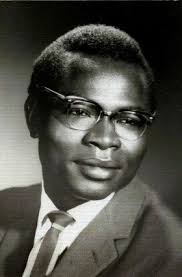
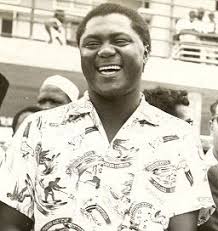



BARACK OBAMA SNR - MBOYA
...On a hot July weekend nearly 40 years ago, Barack Obama Sr. was shopping on a busy Nairobi street when he ran into his friend and mentor Tom Mboya, one of Kenya's most charismatic political leaders. The two chatted for several minutes and Obama kidded him that his car was illegally parked.
I told him, 'You are parked on a yellow line. You will get a ticket," Obama, the late father of the US presidential candidate, would later testify, according to press accounts at the time. And then the two men parted.
Minutes later, Mboya was shot twice and died in a pool of blood. It was a crime that convulsed the newly independent nation and would, in Obama's eyes, trigger a steep decline in his own promising career. Then 33, and a freshly minted government economist, he testified in the ensuing trial, an act which probably enraged those responsible for Mboya's assassination.
Obama, according to one friend, was convinced he had been targeted for murder after his testimony.
"He said he had been hit by a car not long ago and left for dead," said Pake Zane, 66, who attended the University of Hawaii with Obama and had not publicly discussed their 1974 conversation until now. "He did not say specifically who had done it, but he said it was the same people who killed Mboya." ...
MALCOLM X - BARACK OBAMA (snr)- OGINGA ODINGA
By Norman (Otis) Richmond
El-Hajj Malik El-Shabazz (Malcolm X) was assassinated 44 years ago, on February 21, 1965, because of his attempt to internationalize the African American struggle for self-determination.
Malcolm would have been 84 years old on May 19, 2009. Africans in New York City have made a pilgrimage to Malcolm's gravesite every year since February 21, 1966. While it is unlikely that U.S. President Barack Obama will acknowledge Malcolm’s joining the ancestors, people from Cape Town to Nova Scotia and Brazil to Brixton definitely will.
Unlike other U.S. presidents, President Obama knows who Malcolm was and what he stands for. Like many males with African roots President Obama was moved by Malcolm’s life story. A cursory reading of his autobiography, Dreams from My Father will prove this point.
President Obama is truly an African American; parts of his roots are with the Luo people in East Africa. The Luo are an ethnic group in Kenya, Eastern Uganda, and Northern Tanzania. The Luo are the third largest ethnic group (13%) in Kenya, after the Kikuyu (20%) and the Luhya (17%). The Luo and the Kikuyu inherited the bulk of political power in the first years following Kenya's independence in 1963.

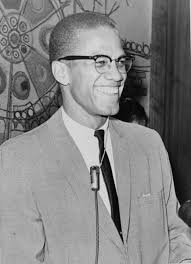
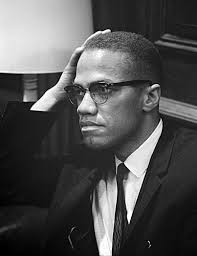

When Malcolm visited African in 1964 he visited Kenya, Uganda and Tanzania. It was during that trip that he met with Kenyan President Jomo Kenyatta, Uganda’s president Dr. Milton Obote, President Julius K. Nyerere and Muhammad Babu of Tanzania. Babu, Malcolm and Leroi Jones (now Amiri Baraka) held a meeting during this period in New York City. Malcolm talked about meeting President Kenyatta, Malcolm however, was also aware of Kenya ’s Oginga Odinga.
When Malcolm was killed in 1965 Kenyatta was still in power and Odinga and Kenyatta were still comrades. Jaramogi Ajuma Oginga Odinga (1911 –January 20, 1994) was a Luo Chief, who became a prominent figure in Kenya's struggle for independence...
81
posted on
07/21/2009 4:05:19 AM PDT
by
Fred Nerks
(fair dinkum!)
To: Fred Nerks
82
posted on
07/21/2009 3:56:55 PM PDT
by
Fred Nerks
(fair dinkum!)
JOMO KENYATTA - PAUL ROBESON"...He was during this period also an active member of a group of African, Caribbean and American intellectuals who included C.L.R. James, Eric Williams, W.A. Wallace Johnson, Paul Robeson, and Ralph Bunche. A good number of streets in Nairobi were named during his presidency after those early black-emancipation intellectuals .
"...Kenyatta also acted as an extra in the film Sanders of the River (1934), directed by Alexander Korda and starring Paul Robeson.

SANDERS OF THE RIVER.LINK

"...So why in the world did Paul Robeson agree to take a role that seems to pretty obviously debase himself and proved to be something of an embarrassment in an otherwise very distinguished career? A documentary on the disc titled "True Pioneer: The British Films of Paul Robeson" helps answer the question. Robeson and his wife moved to England in the late 1920s, after he had already become famous in the USA as a powerful stage actor and singer. He basically left the States in order to escape the blatant racism that he believed deterred him from pursuing the kinds of artistic opportunities that interested him. England at that time had a lot more to offer, though as he learned, the UK was hardly without its cultural blindspots. Still, he saw the role of Bosambo in this film (which was a big budget production and a significant release in its time) as a showcase that would help bring about a greater awareness and appreciation of African people and culture.
It was also a chance to earn a significant paycheck, and also to put many of his new acquaintances to work as extras in the film. Among them was Jomo Kenyatta who would go on to become the founding father of the modern nation of Kenya. To some extent, I think we can say that Robeson succeeded, though even in its time, his participation in the movie earned him rebuke from black leaders including a notable scolding from black nationalist and anti-colonial visionary Marcus Garvey.
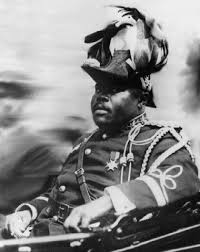
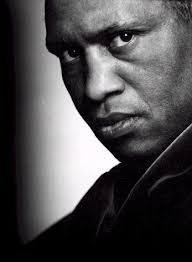
83
posted on
07/21/2009 11:18:13 PM PDT
by
Fred Nerks
(fair dinkum!)
To: LucyT
PAUL ROBESON - THE FRANK MARSHALL DAVIS NETWORK...Robeson returned to New York briefly in 1933 to star in the film version of Emperor Jones before turning his attention to the study of singing and languages. His stay in the United States was a short one due to his treatment by the racist American film industries and because of criticism by blacks regarding his role as a corrupt emperor. Upon returning to England, Robeson eagerly immersed himself in his studies and mastered several languages. Robeson along with Essie became an honorary members of the West African Students' Union, becoming acquainted with African students Kwame Nkrumah and Jomo Kenyatta, future presidents of Ghana and Kenya, respectively...


FRANK MARSHALL DAVIS

...“Davis’s initial contacts with Hawaiiall had extremely strong ILWU ties. (Communist party member) Paul Robeson’s own Hawaiiacquaintances, which he passed on to Davis, insured that ‘when I came over, one of the first things that I got involved with―well, I met all the ILWU brass, (Communist Party executive committee member) Jack Hall and all of them, and I went―they had both of us over to various functions for them―Harriet Bouslog (Communist Party executive committee member) was also a good friend.’”
84
posted on
07/22/2009 12:16:27 AM PDT
by
Fred Nerks
(fair dinkum!)
The latest news from the ILWU Local 142!March 12, 2009 - Barack Obama Senior in 1962 Latest

Barack Obama (senior) was one of the featured speakers at a Mother’s Peace Rally in Ala Moana Park on Sunday May 13, 1962. ILWU leaders, including Jack Hall, joined the march and rally. Obama, an African student from Kenya studying economics at the University of Hawaii Afro-American Affairs Institute, told the crowd of 350, “Anything which relieves military spending will help us...Peace will release great resources...”
The march for peace was featured in the May 18, 1962 issue of the VOICE OF THE ILWU. Other speakers included Patsy Mink, Thomas Gill, Ralph Vanderslice, Rev. Nicolas Dizon, Rev. Seikan Higra, Rabbi Roy Rosenberg, Rev. Delwyn Rayson, and Dr. John Mollet.
The ILWU was opposed to the escalating US involvement in Vietnam and held many activities to educate its members and the public.
85
posted on
07/22/2009 2:54:14 AM PDT
by
Fred Nerks
(fair dinkum!)
To: LucyT
The Unauthorized Biography of a MarxistThe Washington Post Reported that when Barack Obama, Sr. first arrived in Hawaii he was interviewed by the Hawain Press, the reporter Hirozawa relays Obama’s comments, “he would study business administration and wanted to return to Kenya to help with its transition from tribal customs to a modern economy.” He was concerned, he said, about his generation’s disorientation as Kenyans rejected old ways yet struggled with “westernization”.”
SOURCE
Obama did not mention his opposition to the “Westernization” of Kenya in the interview - Obama was, in fact, a Marxist.
The Washington Post went on to report that, “Taking a room at the Charles H. Atherton branch of the YMCA, not far from campus, Obama quickly adapted to the rhythms of student life. One of his frequent hangouts was the snack bar in an old Army-barracks-style building near his business classes. It was there that he met the Abercrombie brothers, first Neil and then Hal, who had escaped the darkness of Buffalo to attend graduate school in Honolulu, and their friends Peter Gilpin, Chet Gorman and Pake Zane. They were antiestablishment intellectuals, experimenters, outsiders, somewhere between beatniks and hippies, and they loved to talk and drink coffee and beer. Neil Abercrombie went on to become a Democratic Congressman from Honolulu, Hawai.



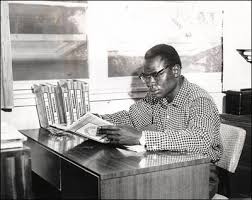
source
The Washington Post went on to elaborate on Obama’s Press interview with Hirozawa, “When asked if people questioned him about Kenya, he laughed and said: “Oh, yes. People are very interested in the Mau Mau rebellion [a long-standing uprising against the British] and they ask about race relations in Kenya. I tell them they’ve improved since the rebellion but are not perfect. They also ask if Kenya is ready for self-government. Some others ask me such questions as how many wives each man has back home, what we eat, how I dress at home, how we live, whether we have cars.”
He [Obama] did not answer those questions in the story. Nor, on one matter, was he forthcoming with his friends at the university. Neither newspaper readers nor his fellow students knew that he had left a son and a pregnant wife back in Kenya.
source
Obama “pontificated on Kenya and nationalism and colonialism and his fears about what might happen.” “He was very concerned that tribalism would trump nationalism,” Neil Abercrombie said. “And that people like himself would not be properly recognized, would not be fully utilized, and there would be discrimination and prejudice. Jomo Kenyatta [Kenya's first post-colonial leader] was a Kikuyu, and Barack and Mboya were Luo, and Kikuyu were going to run things. We’d get into it, that deeply” said Abercrombie.
source
This writer won’t speculate on whether Abercrombie’s memory is faulty, or the Washington Post’s writers notes were in accuate, however, the historical facts are this ….. When Obama Sr. arrived in Hawaii in June 1959, future President Kenyatta was in jail in Kenya. This was a matter of discusssion in local and Internation Press. The Bristish did not call and end to the “State of Emergency” in Kenya until November 1959. Kenyatta was not released from jail in Kenya until July 1961, after Obama Sr. had finished his second year of studies in Hawaii. In June 1962 Barack Obama Sr finisjed his studies at the University of Hawaii, with honors and according to a report in the Honolulu-Star-Bulletin, departed Hawaii for Harvard on June 22, 1962. It wasn’t until May 1963 before Jomo Kenyatta would be elected the first President of Kenya, 11 months after Obama Sr had left Hawaii. In December 1963 Kenya was granted independence. In the spring of 1964 Obama Sr completed his Masters degree at Harvard and returned home to Kenya. In December 1964 Kenya becomes a Republic. While Abercrobie and Obama may have discussed Kenya, the discussion as described, did not place in the time frame reported.
86
posted on
07/22/2009 3:29:26 AM PDT
by
Fred Nerks
(fair dinkum!)
To: LucyT
Our special and historic relationship with Senator Barack Obama's father during our university days: as preceived by some of his friends


Barak Obama (center) and friends at a party given by Arnie and Suzie Nachmanoff, in Pearl Harbor, Hawaii, in the early 1960's

Barak Obama and his friends at a party hosted by Arnie and Suzie Nachmanoff, in the early 1960's, in Pearl Harbor, Hawaii
From left to right: Arnie Nachmanoff, (Former Under Secretary of the Treasury, and host), Suzie Nachmanoff (host), Barak Obama (Kenya), Bob Ruenitz (Fromer Senior State Department official, USA), and Dorothy (USA)
Lower Photo; Taken in Hawaii in 1961 at Arnie and Suzie Nachmanoff's house (Pearl Harbor): from left to right: Kiri Tith (then Cambodia), Kitaichi (Japan), Marda (USA), Ichiro (Japan), Suzie Nachmanoff (Host, USA), Dave (USA), Kunio (Japan), Bob (USA), Rajapakse (Sri Lanka), Barak Obama senior (Kenya), Anne (USA)

87
posted on
07/22/2009 4:03:32 AM PDT
by
Fred Nerks
(fair dinkum!)
To: JDoutrider; arasina; newfreep; BIGLOOK
A once only ping - lots more to the African Colonial story FYI.
88
posted on
07/23/2009 1:28:48 AM PDT
by
Fred Nerks
(fair dinkum!)
To: Fred Nerks; null and void; stockpirate; george76; PhilDragoo; Candor7; BP2; MeekOneGOP; ...
Thank you, Fred Nerks. Excellent research.
lots more to the African Colonial story FYI.
Obama, the African Colonial - Update.
89
posted on
07/23/2009 2:55:05 PM PDT
by
LucyT
(............................. Copy This ............. or Save to File..............................)
To: LucyT
90
posted on
07/23/2009 3:14:55 PM PDT
by
1COUNTER-MORTER-68
(THROWING ANOTHER BULLET-RIDDLED TV IN THE PILE OUT BACK~~~~~)
To: Fred Nerks
Excellent work Fred. BUMP and Bookmarked.
91
posted on
07/23/2009 3:30:15 PM PDT
by
hoosiermama
(ONLY DEAD FISH GO WITH THE FLOW.......I am swimming with Sarahcudah! Sarah has read the tealeaves.)
To: BP2; BIGLOOK; Beckwith
Now I am beginning to wonder - is THIS how Obama Snr arrived in Hawaii in 1959 - ON A SHIP OF THE BLACK STAR LINE?

That's why there are sailors in the picture - and there he is, Stanley Armour Dunham in the welcoming committee.
NUKRUMAH - BLACK STAR LINE -
"...But as soon as Nkrumah won independence and drove the British out of Ghana, one of his first acts was to sign the Black Star Line into being. Nkrumah told them, "You laughed at Garvey, but you will never laugh at us." And he signed in the Black Star Line, which was to travel the world as the the ocean-going fleets of Ghana...
TRAVELLING TO AFRICA BY SEA
...In the early1960’s, another friend took the Black Star Line to Ghana. It was also a freighter trip. His experience was quite a different story. It was when Ghana had recreated the Black Star Line under the then president, Kwame Nkrumah. One of the ships was the Afram River which had made a maiden voyage to the U.S. The political fervor around the relaunching of the Black Star Line impressed the black activists of the time and our friend decided to make his move to Ghana by ship where he could take all his belongings and take up his new teaching assignment. He was thrilled by the fact that the entire crew, including the captain were all Africans...
MARITIME IMAGES
Black Star Line (State Shipping Corporation) Ghana
Operated ships registered in Israel (Zim Line). U.S. and Canadian agents: American Israeli Shipping Co.
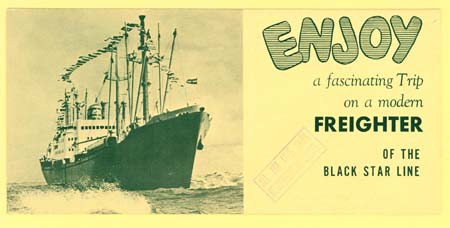
92
posted on
07/23/2009 8:56:09 PM PDT
by
Fred Nerks
(fair dinkum!)
To: Fred Nerks
Did the Black Star Line go to Hawaii in 1959?
To: Albertafriend
94
posted on
07/25/2009 3:05:32 AM PDT
by
Fred Nerks
(fair dinkum!)
To: Beckwith
‘Remembering my friend Barak Obama
‘I met Barak, for the first time in the courses in economics that we took together at the University of Hawaii, in the early 1960’s. It was not difficult to spot Barak, as he was a rare African student on the Campus at the University of Hawaii, in Manoa Valley, Honolulu.
‘His easy-going manner, especially his infectious smile, and his proud bearing struck me the most. He was always very inquisitive and active in class discussions and after classes as well.
‘Although he was not an East-West Center grantee, he was always with us, especially at a Guest House owned and operated by the Asia foundation, situated on the top of road leading to Manoa valley. Atherton House was a place where most East-West Center grantees gathered for a drink or a chat.
‘Barak and I were a part of a small group of foreign students who participated in group discussions in various places (Churches, sinagogues, junior colleges) around the campus and in town. Those discussions centered on the role and impact of former Soviet Union and China had in the developing countries. Barak, was more hopeful than I was about the role and the influence of these two major Communist countries in the developing nations in the world, because I had the opportunity to study in Europe, and in France, especially, I was more aware of the nature of communism than Barak was.
‘In these debates, Barak was always very eloquent, and enthusiastic. We often were not on the same side, when discussing Communism in the developing countries. In our disagreement, Barak was always very gracious and fair. He was a very good listener which helped a great deal in making those discussions more constructive and pleasant
‘Finally, by chance when I was a staff member of the IMF, one day, a colleague of mine who led an IMF mission to Kenya in the early 1980’s, told me that he had met a government official named Barak Obama who said he was a classmate of mine in Hawaii. I knew it was the same Barak who was my classmate at the University of Hawaii. Needless to say that I was very happy to finally be able to be in contact again with Barak, after more than ten year of silence. My IMF colleague had given me Barak’s telephone number and I immediately called him in Nairobi. We had a long conversation and we were able to talk to each other a few more times until one day, when I called him and his secretary told me over the phone that he had passed away of an accident. I was shocked and sad to hear the bad news. That was the time I had talked to Barak, in the early 1980’s.
‘Barak was indeed a very special human being, with a lot of dignity and character. He was a very engaging, gracious, warm, and smart person. That is how I remember my friend Barak Obama.’
Washington DC. January 2006
Naranhkiri Tith Ph.D.
http://cambodiana.org/MainreasonsofmysupportofObama.aspx
NARANHKIRI TITH Ph.D. Writes on his webpage:
Present, and Future; by Naranhkiri Tith, Ph.D.
Let me introduce myself and my family
My name is Naranhkiri Tith, I am holding both US and European citizenship (French). I was educated in Europe and North America. I am an economist by profession, and I am specialized in international economics and finance, and in country risks analysis...
~snip
...I am married to Patricia Zakian, a great and lovely person , and have one wonderful grown up daughter named Teri. I also have a lovable cat, named Mikka (female)...
http://mysite.verizon.net/vzeof03b/id29.html
NOTICE ANYTHING? HE TELLS US HIS WIFE IS NAMED PATRICIA, HIS DAUGHTER TERI AND HIS CAT IS MIKKA.
But there’s nothing in his letter ‘Remembering My Friend Obama’ about Stanley Ann in the early 1960s. Nothing. And there’s nothing about a tribal marriage and a child in Kenya.
95
posted on
07/25/2009 4:08:42 AM PDT
by
Fred Nerks
(fair dinkum!)
http://canadafreepress.com/index.php/article/13098
Dreams from My Father, Pathology from My Mother
Excerpt:
“...Obama never needed his father’s coaching to learn to loathe America. His mother had little approbation for American traditions and values. Dunham may have been altogether earnest in her belief that socialism was the best apparatus to help the impoverished Third Worlders with whom she so identified. Dunham seems to have been imbued with the theory of the noble savage; the belief that man in his primitive state was free and good. Man was corrupted, therefore, by the accumulation of private property, leading to inevitable inequitable outcomes. The noble savage myth presupposes that civilization is the cause of corruption. Note the consistency of this line of thinking with Ikenga’s writings about the African Colonial.
Dunham’s parents were at ease with communism. Recall their affiliations with conspicuous communists, Paul Robeson and Frank Marshall Davis...
96
posted on
08/01/2009 5:05:10 PM PDT
by
Fred Nerks
(fair dinkum!)
To: BP2; Iowan; LucyT
A LITTLE MORE HISTORY AND A FEW SURPRISES.
What a year that was, when Stanley Ann Dunham graduated in the summer of 1960. What an incredible year. Castro and Kruschev at the United Nations in New York. Malcolm X met Castro at the Hotel Theresa, John Kennedy campaigned at that same hotel.


WIKI: "It has a striking white brick facade and was known as the "Waldorf Astoria of Harlem." From the time it opened until 1940, the hotel accepted only white guests plus a few black celebrities. This changed when the hotel passed to new management.
"Louis Armstrong, Sugar Ray Robinson, Lena Horne, Josephine Baker, Dorothy Dandridge, Duke Ellington, Muhammad Ali, Dinah Washington, Ray Charles, Little Richard, and Jimi Hendrix all stayed in the Hotel or lived there for a time, as did Fidel Castro, while in New York for the 1960 opening session of the United Nations, after storming out of the Hotel Shelburne because of that hotel manager's "unacceptable cash" demands.[1] Castro's entourage rented 80 rooms at the Theresa for $800 per day.[2]
"The hotel profited from the refusal of prestigious hotels elsewhere in the city to accept black guests. As a result, black businessmen, performers, and athletes were thrown under the same roof.
"After leaving the Nation of Islam, Malcolm X maintained his competing Organization of Afro-American Unity at the hotel and hosted meetings there. He met Cassius Clay in the hotel on various occasions.
"Bill Clinton's commerce secretary, Ron Brown, grew up in the hotel, where his father worked as manager. U.S. Congressman Charles Rangel (D-Harlem) once worked there as a desk clerk.
"The hotel may have enjoyed its greatest prominence in 1960. Nikita Khruschev visited New York in that year, during the week when Castro was staying in Harlem, and came to meet him in the hotel. Also, in October 1960, John F. Kennedy campaigned for the presidency at the hotel, along with Eleanor Roosevelt and other powerful figures in the Democratic Party."
Obama wrote in Dreams From My FatherStanley Ann was accepted to attend the University of Chicago. She didn't want to go to Hawaii. Her Uncle, Charles Payne was the Deputy Director at the Library at the University of Chicago. Many years later, Barack Hussein Obama taught law there. The Uncle, Madelyn's brother, was still at the University of Chicago while Obama taught there...


A good place to start a study of the 'African Colonial' history is with W.E.B. Du Bois. Du Bois became a member of the Communist Party, and after numerous visits, was invited to live in Ghana by President Kwame Nkrumah, where he died two years later and Ghana gave him an elaborate State funeral.

Shirley Graham Du Bois and Kwame Nkrumah at Du Bois' casket.
Resources on the life and legacy of W.E.B. Du Bois
1951 Indictment, trial, and acquittal of subversive activities charges brought against him by the Justice Department; marries Shirley Graham.
1951-1959 Extensive speaking, writing, and international travel; wins Lenin Peace Prize in 1958.
1961 Becomes member of the Communist Party, U.S.A. Invited to Ghana by President Kwame Nkrumah to edit the Encyclopedia Africana.
1963 Becomes citizen of Ghana. Dies on August 27th and is buried with a state funeral in Accra. Du Bois's death is announced by Roy Wilkins of the NAACP as the March on Washington begins on August 28th.
source
DU BOIS IMAGE ARCHIVE
Malcolm X went to Ghana in 1959 and again in 1964. A photograph of Malcolm X with Shirley Graham Du Bois in 1964:
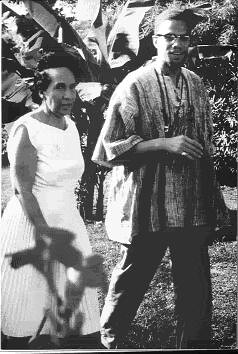
Malcolm X of the Muslim Mosque, Inc. and Shirley Graham DuBois, Director of Ghana National Television, at her villa in Accra, Ghana during Malcolm's visit in May 1964. DuBois had thrown a reception in his honor.
Jeremiah Wright's 'church' displays images of Du Bois, Malcolm X and a fellow named Marcus Garvey. Who was Marcus Garvey? An article entitled 'The Madness of Marcus Garvey' answers that. Briefly, he saw himself as royalty, expected to be bowed to and dressed himself in highly decorated uniforms with towering feathers on his hat...but more than that, he founded a shipping line. It reads like a huge scam, lots of blacks lost all their investments, and he would never admit that he was a failure. Even when he was down to one ship, he still maintained he was running a profitable shipping line. It's an interesting story all on its own...

..."...He imagines miserable failures to be great successes and a credit to him. He confesses the loss of nearly a million dollars of poor people's money and that there is nothing left but debts. He confesses the utter loss of every vessel of his, "Black Star Line," and then boasts of the success of his shipping line. In one breath he says that all three of his ships are gone; that there is nothing left out of nearly $1,000,000 but debts. In another breath he states that "if it hadn't been for our enemies, we would now have twenty vessels instead of three." He still seems under the delusion that he has three. He has a court reception, divides Africa in which he or his movement hasn't one foot of ground into duchies and makes "knights" and "ladies" and "dukes." Those presented to him must bend the knee before him. Arrayed in royal garb, he and his court assemble on an elevated dais while the common people are below, kept away from him by armed guards. Here is clearly a case of delusions of grandeur. Could a symptom be more characteristic?...
source
many years later, when Nkrumah became President of Ghana, because Marcus Garvey was now seen as a saint, Nkrumah started up a State shipping line and named it after Marcus Garvey's Line:
"...But as soon as Nkrumah won independence and drove the British out of Ghana, one of his first acts was to sign the Black Star Line into being. Nkrumah told them, "You laughed at Garvey, but you will never laugh at us." And he signed in the Black Star Line, which was to travel the world as the the ocean-going fleets of Ghana, which still exist even today despite all the attacks, internal and external, that it has undergone...
The Black Star Shipping Line. Ghana then had 14 ships and they sailed the world oceans, the prime export of Ghana being cocoa. Or it was, until Nkrumah ruined the economy, as all good little marxists are inclined to do:

....Some elder Detroit black nationalists recall the visit of a Black Star steamship in August 1964. Malcolm X's eldest brother, the late Wilfred Little Shabazz, himself a son of Garveyites, told the author of his pride at meeting the ship's captain and posing for photographs, one of which appeared in Now, a black nationalist magazine published by Detroit attorney Milton Henry.
source
...However, by the mid-1960s, despite his accomplishments in developing the African community, Nkrumah's domestic rule had became negative, and later, almost despotic & dictatorial. At the time he ascended to power, the newly independent Ghana had one of the strongest economies in Africa, but by the time he lost power, Ghana was heading towards economic ruin, as a combination of corruption & inefficiency, and his attempts to industrialize Ghana came at the expense of the previously strong-performing cocoa-producing sector. Costly, and largely unsuccessful public works programs also took their toll on the economy...
source
There is no hard evidence that Stanley Ann Dunham ever showed up in Hawaii. None. There remains this question:
'Where was Stanley Ann Dunham between the summer of 1960 when she graduated and when she returned to Hawaii with a two or three year old child?'
To find an answer to that question, one must ignore all the articles published in the press, everything written does nothing but follow the narrative of Dreams From My Father. It is extremely difficult however, not to be influenced by that narrative, which has found it's way almost into the subconscious, by being endlessly repeated, with glaring anomalies, such as; Barack Obama Snr left Stanley Ann Dunham when the child was two years of age...when in fact, he departed from Hawaii for the mainland in June, 1962. All that oft repeated assertion achieves is cast doubts upon his claimed date of birth.
The more one reads of that period in history, and the lives of the people involved, the more one finds one is reading about Ghana. The list of African-Americans who, maintaining they were discriminated against in the US and moved to Ghana is a long one. A very long one. But one of the most interesting is Maya Angelou. Maya Angelou, who refers to Malcolm X as her brother. Maya Angelou, who Malcolm X visited in Ghana. Maya Angelou who planned to return to the US and work for Malcolm X...

Developing a brother/sister relationship with Malcolm X has been very important to me. Because Mr. Malcolm X came to Africa, and I was able, along with others, to help him to meet all of the Africans of power in Ghana at the time...
source
...Maya Angelou returned to America in 1964, with the intention of helping Malcolm X build his new Organization of African American Unity. Shortly after her arrival in the United States, Malcolm X was assassinated, and his plans for a new organization died with him...
source
Something strange was happening in Hawaii during the same period. W.E.B. Du Bois and Paul Robeson were close. Very close. It was Paul Robeson whom Frank Marshall Davis credited with introductions to the communists in Hawaii:

......"Davis's initial contacts with Hawaii all had extremely strong ILWU ties. (Communist party member) Paul Robeson's own Hawaii acquaintances, which he passed on to Davis, insured that when I came over, one of the first things that I got involved with¯well, I met all the ILWU brass, (Communist Party executive committee member) Jack Hall and all of them, and I went¯they had both of us over to various functions for them¯Harriet Bouslog (Communist Party executive committee member) was also a good friend.'"
source

One turns up some very strange information, some of it hard to believe: Paul Robeson made a film and gave the part of an african chief to none other than Kenyatta! The very same man who would one day become the leader of Kenya and Barack Hussein Obama Sr's employer...
source


...It was also a chance to earn a significant paycheck, and also to put many of his new acquaintances to work as extras in the film. Among them was Jomo Kenyatta who would go on to become the founding father of the modern nation of Kenya. To some extent, I think we can say that Robeson succeeded, though even in its time, his participation in the movie earned him rebuke from black leaders including a notable scolding from black nationalist and anti-colonial visionary Marcus Garvey.


...Nkrumah met DuBois near the end of his sojourn in America, about the time the elder intellectual returned to the NAACP after breaking with it a decade earlier over his advocacy of temporary "self-segregation." Keenly interested in the possibilities for colonial freedom in the wake of the Second World War and the creation of the United Nations, DuBois considered the special research office as "sort of a foreign affairs department of the NAACP."
...Nkrumah also worked with the Council on African Affairs, co-founded by African American social worker Max Yergen and the renaissance man of the 20th century, Paul Robeson...

Oginga Odinga, the father of Raila Odinga, of recent Kenyan infamy, visited Malcolm X and was embraced by him. Literally. There was a popular song written about Oginga Odinga in the US at the time:
...Odinga sat on the edge of his chair and leaned forward, facing Joe and I. He told us of his visit to America and how American Freedom Fighters-civil rights activists had secretly visited with him in Atlanta as he was under State Department security control. He told us how the famous American Freedom Fighter, Malcom X had embraced him (Odinga) and that there was even a song written in America called, "Oginga Odinga of Kenya."
source



...When Malcolm visited African in 1964 he visited Kenya, Uganda and Tanzania. It was during that trip that he met with Kenyan President Jomo Kenyatta, Uganda's president Dr. Milton Obote, President Julius K. Nyerere and Muhammad Babu of Tanzania. Babu, Malcolm and Leroi Jones (now Amiri Baraka) held a meeting during this period in New York City. Malcolm talked about meeting President Kenyatta, Malcolm however, was also aware of Kenya 's Oginga Odinga...
source
That Malcolm however, was also aware of Keyna's Oginga Odinga appears to be an understatement; Malcolm had embraced him in Atlanta.
Barack Hussein Obama Snr. Who was he? What was his purpose? In 1953 back in Kenya, a seventeen year old Barack Obama Snr finished school and his teacher tells us that he went straight to America for further education:
...Oyula says Obama Sr went straight to the US from Maseno, to start his academic tour.
source
That's very strange - but is it? Oginga Odinga had two sons, one was educated in East Germany, the other at the Patrice Lumumba University in Moscow. And this Oginga Odinga had once been a teacher at the very same school in Maseno...
source
How could Obama Snr suddenly show up in Hawaii, sponsored or not, and attend a University. His educational background was so sketchy. Looking further, one discovers he did not arrive with the first airlift arranged by Mboya, nor did he, as claimed in 'Dreams' benefit from the funds provided by the Kennedy foundation which paid for the chartered aircraft to bring the students to the US; the first of which landed at Idelwild in September...
Barack Obama wrote that his father "had been selected by Kenyan leaders and American sponsors to attend a university in the United States," but a list of the students who landed in New York on September 9, 1959, does not contain the name of the elder Obama. Tom Shachtman, working in the African-American Students Foundation (aasf) papers for a book on the airlifts, has found that the elder Obama came in 1959 with support from the aasf but appears to have been routed a different way as he made his way to the University of Hawaii...
source
Obama Snr in fact found his own way to Hawaii several months before, and judging by the undated image of the welcoming committee, he arrived by ship. It's odd, isn't it, that amongst the people on the dock, there he is, Stanley Armour Dunham. In June or July 1959?

From where had he come? Had he been on the mainland for some years as a student? That 'Kenyan goat-herder grandfather story' is all very well, but this man Barack Hussein Obama Snr did not behave as a simple student in Hawaii, he was an activist; within a very short time he is pictured giving lectures to Union members; from where did he get this authority? Why would several hundred members of a Union listen to this newly arrived student from Kenya?

Barack Obama (senior) was one of the featured speakers at a Mother's Peace Rally in Ala Moana Park on Sunday May 13, 1962. ILWU leaders, including Jack Hall, joined the march and rally...
source
But the question may aswer itself if we take into account a possible prior sojourn on the mainland; connections to Frank Marshall Davis and Davis' membership of the communist party.
source
Images of Obama Snr from the time, and letters written as testimonials, show no Stanley Ann - there is no mention of her. None. It's almost as if she didn't exist. Not in Hawaii.
Was Stanely Ann still on the mainland? Did she in fact spend time in Chicago, where she was accepted to attend the University of Chicago? Was her enrollment in Hawaii nothing but an anticipation by her parents, that never eventuated? The closer one looks, the less likely it becomes that she ever met Obama Snr. Anywhere.
And what was that all about, her enrollment in extension courses with an address in Seattle? The address shown in the Polk Directory 1961/62 where she supposedly lived with her young son, is recorded as having been strictly segregated. Extension courses can be completed and returned from anywhere. Was that address in the Polk Directory for Anna Obama nothing but a convenient mail-box? She was enrolled as Stanley Ann Dunham. Why use a different name for an address? Unless...she didn't want to be found.
On February 27, 1951, fifty-four year old Shirley Graham and eighty-four year old W.E.B. DuBois married in New York City.In 1961, they both renounced their U.S. citizenship and became citizens of Ghana. She had two sons from a previous marriage. One, David Graham, took the name Du Bois when his mother re-married. David was born in Seattle in September 1925. His grandfather, Shirley Grahams father, was minister at First AME Church in Seattle. David Du Bois career is interesting:
Arab Observer, Cairo, Egypt, editor and reporter, 1960-72; Cairo University, lecturer; Egyptian Gazette, news editor; Middle East News and Features Agency, editor and reporter; Radio Cairo, announcer and program writer; Ghana government, public relations consultant, 1963-66; Black Panther Party, spokesperson; The Black Panther, editor-in-chief...
source
Reading that, one is reminded of Maya Angelou again, and one may wonder if they knew each other or if their paths crossed:
...In the same year she met and married, South African freedom fighter Vusumzi Make. Again, Angelou and Guy moved; this time with Make to Cairo, Egypt where, despite her husband's restrictions, Angelou took a job as associate editor of the Arab Observer. By 1963, Angelou's second marriage was over and, determined to remain in Africa, Angelou moved to Ghana where, in her writings, she states that she felt at home for the first time in her life. In Ghana, Angelou served as an administrator for the School of Music and Drama at the University of Ghana, and acted as feature editor for the African Review...
source
Was there a connection between Maya Angelou's return to the US in 1964 and Stanley Ann showing up in Hawaii in the same year with a kinder-garten aged child?
Right now, there's no way I can verify this, it came by e-mail:
During a telephone interview, one of Stanley Ann Dunham's classmates from Mercer Island let something slip:
Stanley Ann Dunham had sent her a post-card from a ship. In February. 1961. Imagine that.
There it was, the answer to how so many people travelled back and forth to Ghana, and many other destinations; they had a State owned shipping line at their disposal. No need to look for airline schedules.
...In the early 1960's, another friend took the Black Star Line to Ghana. It was also a freighter trip. His experience was quite a different story. It was when Ghana had recreated the Black Star Line under the then president, Kwame Nkrumah. One of the ships was the Afram River which had made a maiden voyage to the U.S. The political fervor around the relaunching of the Black Star Line impressed the black activists of the time and our friend decided to make his move to Ghana by ship where he could take all his belongings and take up his new teaching assignment. He was thrilled by the fact that the entire crew, including the captain were all Africans and he was honored to dine with the captain and crew. He loved stopping at all the African ports en route to Ghana...
source

AFRAM RIVER.source
Ports of call
U.S. Gulf ports, U.S./Canadian Great Lakes and Atlantic ports, Freetown, Monrovia, Takoradi, Tema (Accra), Lagos, Port Harcourt, Douala.
source
97
posted on
08/05/2009 4:13:34 AM PDT
by
Fred Nerks
(fair dinkum!)
To: Fred Nerks
looks like I got some reading to do..................
To: Fred Nerks
Thanks so much, Fred Nerks
Excellent research.
Ping
99
posted on
08/05/2009 10:41:11 AM PDT
by
Iowan
To: Fred Nerks; null and void; stockpirate; george76; PhilDragoo; Candor7; BP2; MeekOneGOP; ...
Thanks, Fred Nerks. Excellent, as usual. Bookmarked.
Your research needs to be archived in The Library of Congress in Washington, D.C. (How can we make it happen?)

Ping to #97 for History and a Few Surprises.
Scroll backwards, too, in case you missed a few posts.
100
posted on
08/05/2009 11:50:12 AM PDT
by
LucyT
Navigation: use the links below to view more comments.
first previous 1-20 ... 61-80, 81-100, 101-120 ... 1,541-1,560 next last
Disclaimer:
Opinions posted on Free Republic are those of the individual
posters and do not necessarily represent the opinion of Free Republic or its
management. All materials posted herein are protected by copyright law and the
exemption for fair use of copyrighted works.
FreeRepublic.com is powered by software copyright 2000-2008 John Robinson





































